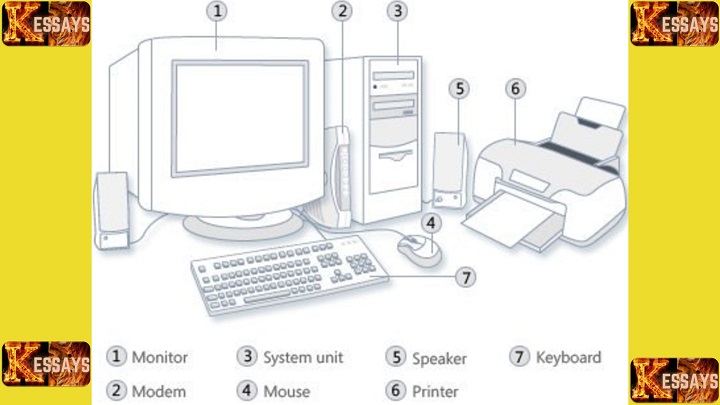Introduction
In the digital age, application software has become integral to our daily lives. From communication to productivity, entertainment to education, application software permeates every facet of our existence. This essay delves into the evolution of application software, its various categories, and its profound impact on society.

Evolution of Application Software: Tracing Its Origins and Impact
Early Beginnings
The roots of application software extend deep into the earliest days of computing. In the mid-20th century, software development involved writing intricate machine code, demanding an extensive grasp of technical intricacies. However, the landscape transformed dramatically with the advent of higher-level programming languages such as FORTRAN and COBOL. This shift marked a pivotal moment, democratizing software development and rendering it more accessible to a broader range of individuals.
Rise of Operating Systems
The evolution of application software accelerated further with the emergence of operating systems. These systems introduced a valuable layer of abstraction, enabling programmers to concentrate on crafting applications without being preoccupied with the intricacies of hardware. This pivotal development led to an exponential proliferation of software across diverse domains, revolutionizing the way we interact with technology.
Application Software's Transformative Influence
The pervasive presence of application software is evident in every facet of contemporary life. Whether we realize it or not, we engage with application software daily, leveraging its capabilities for various purposes. Let's explore how application software has transformed different aspects of our existence.
Communication and Connectivity
Application software has redefined communication, collapsing geographical barriers and bridging connections. Platforms like email clients, instant messaging apps, and video conferencing tools have revolutionized how we interact. Whether it's the convenience of Outlook, the ubiquity of WhatsApp, or the seamless virtual meetings on Zoom, application software has amplified our ability to connect, collaborate, and share ideas in real time.
Enhanced Productivity
Productivity has received a substantial boost through application software tailored to streamline tasks. From word processing to spreadsheet management and presentation creation, tools like the Microsoft Office Suite, Google Workspace, and Adobe Acrobat have transformed the way businesses operate. These applications have streamlined documentation, empowered efficient collaboration, and elevated overall productivity levels.
Entertainment and Leisure
The realm of entertainment has experienced a paradigm shift with the advent of application software. Gaming, multimedia players, and streaming platforms have revolutionized how we unwind and enjoy leisure time. The gaming industry, driven by blockbuster titles like Fortnite and Minecraft, has not only entertained but also created a robust economic ecosystem. Similarly, platforms like Netflix and Spotify have altered the way we consume media, offering on-demand access to a vast array of content.
Learning and Education
Education, both formal and informal, has witnessed a remarkable transformation thanks to educational software. Platforms such as Coursera, Khan Academy, and Duolingo have democratized access to education, offering interactive and personalized learning experiences to individuals around the globe. These applications cater to diverse learning styles, enhancing engagement and knowledge acquisition beyond traditional classroom boundaries.
Categories of Application Software
Productivity Software
Productivity software enhances efficiency by aiding tasks such as word processing, spreadsheet management, and presentation creation. Notable examples include Microsoft Office Suite, Google Workspace, and Adobe Acrobat. These tools revolutionized business processes and streamlined documentation.
Communication Software
Communication software revolutionized how we connect. Email clients, instant messaging apps, and video conferencing platforms like Outlook, WhatsApp, and Zoom have bridged geographical gaps, enabling real-time interactions and collaboration on a global scale.
Entertainment Software
Gaming, multimedia players, and streaming applications fall under this category. The gaming industry, propelled by titles like Fortnite and Minecraft, generates billions in revenue. Similarly, streaming platforms like Netflix and Spotify have reshaped how we consume entertainment content.
Educational Software
Educational software, both for formal and informal learning, has transformed traditional education models. Platforms like Coursera, Khan Academy, and Duolingo offer interactive and personalized learning experiences, democratizing education worldwide.
Impact on Society
Enhanced Connectivity
Application software has transformed the world into a global village. Social media platforms like Facebook, Twitter, and Instagram have enabled instantaneous sharing of thoughts and experiences, fostering connections beyond borders.
Empowerment of Businesses
Enterprise resource planning (ERP) systems, customer relationship management (CRM) software, and project management tools have revolutionized business operations. They optimize resource allocation, improve customer interactions, and enhance project coordination.
Job Creation and Economic Growth
The software industry's growth has led to job creation in software development, user experience design, quality assurance, and technical support. Additionally, the app economy has emerged, enabling individuals and small businesses to develop and market their software solutions.
Challenges and Future Trends
Security Concerns
The prevalence of application software has given rise to cybersecurity threats. Malware, data breaches, and privacy concerns have prompted the need for robust security measures to protect users' sensitive information.
AI and Automation
The integration of artificial intelligence and automation into application software is a burgeoning trend. From AI-powered chatbots to automated data analysis, these technologies enhance user experiences and streamline tasks.
Cross-Platform Development
As users demand seamless experiences across various devices, cross-platform development frameworks like React Native and Flutter are gaining traction. These frameworks expedite software deployment on multiple platforms.
Future Trends:
-
Augmented Reality (AR) and Virtual Reality (VR) Integration
- Incorporating AR and VR elements into application software for immersive experiences.
- Opening up new avenues for interactive entertainment, education, and training.
-
Edge Computing
- Moving processing closer to the data source rather than relying solely on cloud computing.
- Reducing latency and enhancing real-time performance in applications.
-
Personalization and Customization
- Developing application software that adapts to individual user preferences and behaviors.
- Enhancing user engagement and satisfaction through tailored experiences.
-
Blockchain Integration
- Exploring the integration of blockchain technology for enhanced security and transparency.
- Potential applications include secure transactions, data integrity verification, and digital identity management.
-
Voice and Natural Language Interfaces
- Increasing adoption of voice recognition and natural language processing in application interfaces.
- Enabling more intuitive and efficient interactions between users and software.
-
Quantum Computing Impact
- Monitoring the development of quantum computing and its potential impact on software capabilities.
- Preparing for quantum-resistant encryption and advanced computational tasks.
-
Sustainability and Green Computing
- Focusing on energy-efficient coding practices and reducing software's environmental impact.
- Meeting growing concerns about the carbon footprint of technology.
-
Emphasis on User Data Control
- Shifting towards giving users more control over their data, including permissions and sharing.
- Increasing transparency in data collection and usage practices.
-
Enhanced Data Analytics
- Leveraging advanced analytics to derive insights from vast amounts of data generated by applications.
- Informing decision-making and improving user experiences.
-
Collaborative and Cloud-Based Workflows
- Promoting collaboration through cloud-based tools and features in application software.
- Facilitating remote work and efficient teamwork.
These additional points provide a comprehensive overview of the challenges and future trends shaping the landscape of application software.

Conclusion
Application software's evolution has profoundly impacted how we communicate, work, learn, and entertain ourselves. Its various categories have revolutionized industries and empowered individuals. As technology continues to evolve, application software will undoubtedly play a pivotal role in shaping the future of human interaction and progress.

